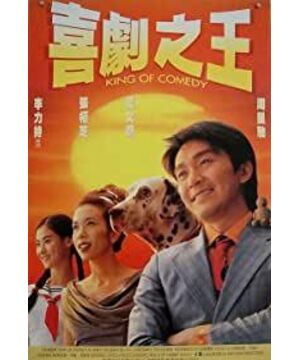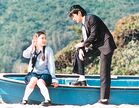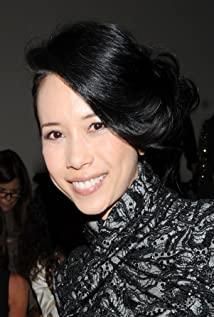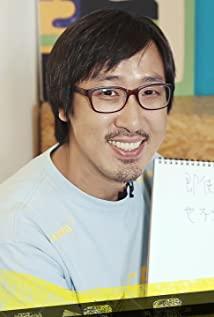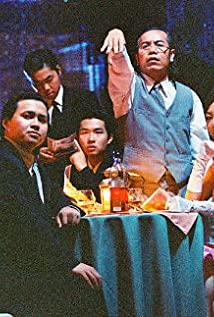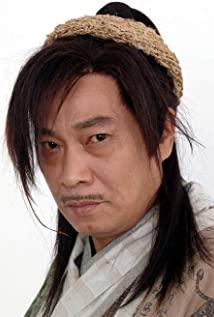After the second stage of the nonsensical carnival, we saw the deconstruction after the carnival. This operation method of postmodern discourse was brought into full play in the two 1995 "Westward Journey". Maybe Liu Zhenwei and Zhou Xingchi, the creators, did not foresee the forward-looking vision of "Westward Journey". When they were creating, they still followed the Hong Kong style, making jokes, making trouble without reason, and even adding all kinds of shit and pee tricks, but this time The object is most familiar to us Chinese - "Journey to the West".
Linking Sun Wukong and "love" is the biggest subversion of the classics in "Journey to the West", because in "Journey to the West", we can find strange imagination, fighting methods of gods and demons, and the purpose of Buddhism. To intercede, I can only barely think of Zhu Bajie. What's more, it is more appropriate to use the word "desire" for Zhu Bajie, rather than "qing", which means that "Journey to the West" and "qing" are actually insulated.
Taking this "insulator" as the most important story theme of the movie is not so much an unexpected refutation, it is better to regard it as the "Journey to the West" of this era. In the first episode "Moonlight Treasure Box", Sun Wukong, who was descended from reincarnation, became the supreme treasure five hundred years later, and fell in love with Bai Jingjing, but in the next episode "Cinderella", when the supreme treasure, in order to find his beloved Bai Jingjing, traveled through Going back five hundred years ago, he fell in love with Fairy Zixia again. Does this kind of empathy only mean that Supreme Treasure is someone who does not use love?
No, because time and space change, people naturally change too. No love is constant, because love is the mutual admiration of a man and a woman in a time and space. When time and space shift, people's emotions will not stay again. Therefore, a 20-year-old couple is sticky like glue, a 30-year-old couple is noisy and irritable, a 40-year-old middle-aged person is like water, a 50-year-old partner is calm and peaceful, and a 60-year-old wife is in a relationship. Supreme Treasure and Bai Jingjing are not in love, but in people. How can the love that belongs to people remain the same.
An interesting phenomenon is the structure of the authoritative classes such as Tang Seng and Guanyin. In "Journey to the West", Tang Seng is always annoying, Guanyin is always cold, one represents the chatter of missionaries, and the other symbolizes the ruthlessness of the authority class. More intense than the novel "Journey to the West" or the mainland TV series "Journey to the West", the movie "Journey to the West" made Sun Wukong's rebellion not only for "himself", but also for "her". Zhou's performance has always used the ridiculousness of small people to ridicule the hypocrisy of big people, which is exactly in line with the symbolic connotation of Sun Wukong. The supreme treasure of mortals is the real Monkey King, and the great sage Qitian with hairy face and Lei Gongzui is a tragic dog.
Classics can be deconstructed, and they are ubiquitous in "Journey to the West", but love is absent in this deconstruction conference. Authority can be destroyed, but emotions must be eternal. Zhou's comedy, which is supported by citizens' psychology, is the only one that can be grasped. It is the love of every mortal. Here, the authority that has always been praised is ridiculed, but the love that every mortal can have is precious. Perhaps, the significance of "Journey to the West" is not the extraordinaryness of comedy, but the eternal immortality of tragedy.
In the same year, Stephen Chow and Liu Zhenwei collaborated again to make a horror comedy film, "The Night of the Soul". This movie can be said to be an alternative among all Stephen Chow movies. It is not a complete comedy, nor is it a complete horror film. , I would honestly prefer to call it a philosophical film that sweeps away fear.
"Back to the Soul Night" tells the story of a patient in a mental hospital who cooperates with the security guard of a building in the community to hunt ghosts. The film constantly imitates movies and animations such as "This Killer Is Not Too Cold" and "Doraemon", combined with the classic ghost film type of Hong Kong films, which makes the story full of highlights, but its value is not here, but It is the mentally ill ghost hunter created by Stephen Chow.
"The genius and the lunatic are only one step away", there is a problem with this sentence, it should be that the philosopher and the lunatic are only one step away, at least in "The Night of the Soul", the anti-authority in "Journey to the West" appears again, but this time But it changed its appearance and became a "sweeping superstition".
People's fear of the unknown is based on two things: one is the unknown, and the other is belief. The unknown is not scary, what is scary is the loss of control brought about by the unknown. The reason why people feel that "home" is the most secure is because the family is the most familiar and can guarantee their control. In this field, people face are all known things. But unknown people or things can make people lose control. Once this happens, and they believe in such things that are out of control, they will have serious fear. "Reported with disdain.
The ghost hunter played by Stephen Chow is not because of his high mana, but because he has yin and yang eyes, so he can have a known vision of things unknown to ordinary people. In "The Devil" is the second play.
"Back to the Soul Night" is an impromptu performance by Liu Zhenwei to save his friend Stephen Chow after the box office fiasco of "Journey to the West". The film became a masterpiece, and Zhou Xingchi has never made a similar attempt since then.
In 1996, "The God of Cookery" was the first film produced by Stephen Chow's Starlight Company. With sufficient funds, Wu Mengda played the villain in Zhou's comedy for the first time. A representative work.
As I said last time, Zhou Xingchi has a "Young Master Trilogy": "Variety Xingjun" is at the bottom, "Wu Zhuangyuan Su Qi'er" is second, and "God of Cookery" should undoubtedly be the first, not only The problem of the presentation of the movie is that this movie has a great relationship with Stephen Chow's current state of mind and life situation. By 1996, Stephen Chow had already made a name for himself. He was a top entertainment star in Hong Kong and Asia. Although the box office of "Journey to the West" failed, the three words "Chow Xingchi" still had a strong box office appeal, so at this time Stephen Chow's His heart will naturally expand, and he will naturally change how he behaves after the expansion. A person's state of mind will always be externalized into his own behavior. For an actor who can control film production, his films at this time undoubtedly show inner contradictions. What's more, he is also one of the directors of "God of Cookery".
The plot of "God of Cookery" develops according to three stages: the power is extremely high, it falls to the bottom, and it emerges from desperation. This kind of old-fashioned plot is actually not very good. What is outstanding is that Zhou Xingchi is in an entertainment situation, and he mixes love, food, and kung fu in a series. It is delicious and good-looking. "Er" is too upright, "God of Cookery" is both warm and fire, playing a bit of Buddhist Zen, not only is not abrupt, but also has a cultural atmosphere, which is a rich presentation of the mentality of the citizens, and Stephen Chow understands this.
The last representative work at this stage is "The King of Comedy" at the end of the century. In fact, according to myself, the plot of this movie is not rigorous, and to a certain extent, it is not even complete. This film is a gift from Zhou Xingchi to himself more than ten years ago. It can also be regarded as a tribute to the future. From then on, he will bid farewell to the 90-year Hong Kong comedy and is about to enter the new century. make.
For the role of Yin Tianqiu, many people think that he is really "attracting revenge". If he does not play dead corpses well on the set, he has to toss out a variety of ways to play dead corpses. What else can you do besides want to scold him?
However, people who toss often have a lot of energy. Such people may not be stable, but they can always win by surprise. In the end, Zhou Xingchi even arranged Yin Tianqiu to be an undercover police officer, testing his "acting skills" in a crisis. This kind of plot full of surreal texture actually made a mockery of the relationship between "actor/undercover". Although life is full of acting skills, there are also crises everywhere. "The King of Comedy" is Zhou's irony to himself. , in fact, "the king of tragedy" may be the emotion he really wants to express.
In this special topic, I avoided talking about the other six films. It is not that the other films have no value to talk about, but that the five films mentioned above have film history value. Some films at this stage are actually suspected of being copied twice, such as "One Dragon" replicates the characters and themes of "King of Destruction"; "Death Reckoning" has the setting of "Death Judge"; and "Dai Nei Detective Zero Zero Hair" is a costume comedy, but it is not the same as "Destruction". "Domestic Lingling Paint" has the same parody; not to mention "The King of a Thousand Kings 2000" is a response to Stephen Chow's famous movie "The Gambler".
When Zhou Chou has already begun to gather capital and set up a company, which has become a symbol of Hong Kong films. With the disappearance of Hong Kong films, Hong Kong filmmakers have collectively moved north, and Zhou Xingchi has also begun to gradually cooperate with international capital to snatch fields in the mainland film market. In the last episode of the topic, I will interpret Stephen Chow's infinite scenery in the early 21st century.
For drafts or reprints, please add WeChat: X1095283911 Next notice: 2001 - 2016
: Culture, capital, performance and excellence will guide
this stage of the film (11):
1995:
"Westward Journey: Moonlight Treasure Box" - Director: Liu Zhenwei
" The Great Sage Marrying the Westward Journey - Director: Liu Zhenwei, Jiang Yuecheng "
Variety Star" - Director: Ye Weimin
"Return to the Soul Night" - Director: Liu
Zhenwei
Stephen Chow and Gu Dezhao
"The God of Cookery" - Director: Stephen Chow, Li Lichi
1997:
"Dead Grass" - Director: Ma Weihao
"97 Families Have a Happy Event" - Director: Zhang Jianting
1998:
"One-stop Luck" - Director: Li Lichi
1999 :
"The King of a Thousand Kings 2000": Director: Wang Jing, Lin Qinglong
"The King of Comedy": Director: Stephen Chow, Li Lichi
View more about King of Comedy reviews


